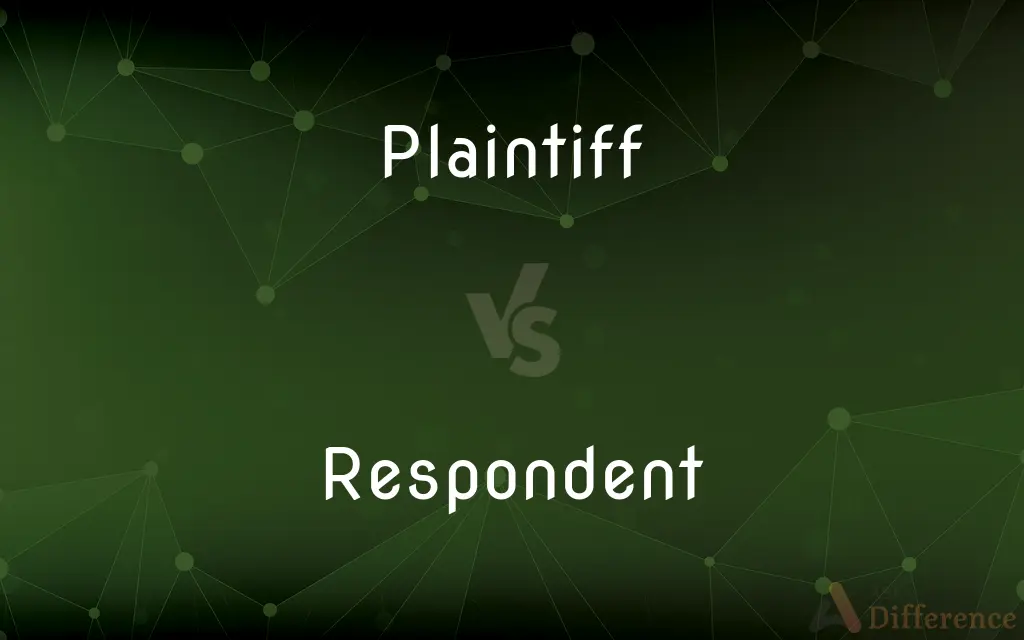Plaintiff vs. Respondent — What's the Difference?
By Tayyaba Rehman & Urooj Arif — Updated on March 29, 2024
A plaintiff initiates a lawsuit in civil court, while a respondent answers a petition in any legal action, including appeals or family law cases.

Difference Between Plaintiff and Respondent
Table of Contents
ADVERTISEMENT
Key Differences
The plaintiff is the party who brings a case against another in a court of law. This term is commonly used in civil lawsuits, where the plaintiff claims to have incurred loss or damage as a result of the defendant's actions and seeks legal remedy from the court. The plaintiff is responsible for filing the complaint, stating the cause of action, and is often seeking some form of compensation or relief.
The respondent, on the other hand, is the party who responds to a petition or appeal in a legal proceeding. While the term can apply broadly across different types of legal actions, it is most notably used in appellate and family law cases. In appellate cases, the respondent is the party against whom the appeal is filed, tasked with responding to the appellant's claims. In family law, the respondent is the party against whom a petition (for divorce, for example) is filed.
One key distinction is their roles in various legal contexts. The plaintiff is always the party initiating a lawsuit in civil court, seeking redress or enforcement of a right. The respondent's role is more variable, depending on the specific legal proceeding. In appeals, the respondent defends the lower court's decision, while in family law, they answer a petition that might involve disputes over matters like divorce or custody.
The terminology used to describe these parties can vary depending on the legal system or court. For example, in criminal cases, the party bringing the action is the "prosecution," not the plaintiff, and the party responding is the "defendant." In some jurisdictions or specific types of legal proceedings, the terms "petitioner" and "respondent" are used instead, particularly in administrative or family court matters.
Both plaintiffs and respondents are integral to the legal process, representing the opposing sides in a dispute or legal matter. The plaintiff's role is to present the case for why they have been wronged or are entitled to legal relief, while the respondent's role is to counter the plaintiff's or petitioner's arguments, defend against the claims, or argue for the legal correctness of a decision being appealed.
ADVERTISEMENT
Understanding the difference between a plaintiff and a respondent is crucial for navigating the legal system, as it helps clarify the positions and responsibilities of the parties involved in a lawsuit, appeal, or other legal proceedings.
Comparison Chart
Definition
The party who initiates a lawsuit in civil court.
The party who answers a petition or appeal.
Legal Context
Civil lawsuits for claiming damages or enforcement of rights.
Appellate cases, family law, and other legal proceedings.
Role
Seeks legal remedy or compensation from the court.
Defends against the lawsuit or petition, or answers to an appeal.
Common in
Civil litigation.
Appeals, family law cases, and some administrative proceedings.
Example
A person sues a company for breach of contract.
A spouse responds to a divorce petition.
Compare with Definitions
Plaintiff
The initiator of a civil lawsuit.
The business owner became the plaintiff in a lawsuit against the contractor for incomplete work.
Respondent
May uphold the lower court's decision in appeals.
The local government, as the respondent, defended the zoning decision upheld by the lower court.
Plaintiff
Presents the case against the defendant.
In a copyright infringement case, the artist as the plaintiff argued the unauthorized use of their work.
Respondent
Answers to a petition in legal proceedings.
In the divorce proceedings, the spouse named as the respondent filed their response to the petition.
Plaintiff
Files the complaint in court.
The homeowner filed a complaint as the plaintiff against the neighbor for property damage.
Respondent
Defends against claims in appellate cases.
The company served as the respondent in an appeal against a lawsuit verdict favoring an employee.
Plaintiff
Seeks compensation or legal remedy.
After an injury at work, the employee filed as a plaintiff seeking damages for medical expenses.
Respondent
Responds to family law petitions.
In a custody dispute, the parent named as the respondent submitted their argument for joint custody.
Plaintiff
Aims to prove the defendant's liability.
The plaintiff in the product liability case provided evidence of the product's defects and the resulting harm.
Respondent
Involved in various types of legal actions.
The tenant became the respondent in the landlord's petition for eviction due to unpaid rent.
Plaintiff
A plaintiff (Π in legal shorthand) is the party who initiates a lawsuit (also known as an action) before a court. By doing so, the plaintiff seeks a legal remedy.
Respondent
A respondent is a person who is called upon to issue a response to a communication made by another. The term is used in legal contexts, in survey methodology, and in psychological conditioning.
Plaintiff
A person who brings a case against another in a court of law
The plaintiff commenced an action for damages
Respondent
A party against whom a petition is filed, especially one in an appeal or a divorce case.
Plaintiff
The party that institutes a suit in a court.
Respondent
A person who replies to something, especially one supplying information for a questionnaire or responding to an advertisement
Most respondents to our questionnaire considered their practices to be in accordance with current medical guidelines
Plaintiff
A party bringing a suit in civil law against a defendant; accuser.
Respondent
In the position of a party defending against a petition
The respondent defendant
Plaintiff
One who commences a personal action or suit to obtain a remedy for an injury to his rights; - opposed to defendant.
Respondent
Replying to something
The respondent firms in the survey
Plaintiff
See Plaintive.
Respondent
Involving or denoting a response, especially a conditioned reflex, to a specific stimulus.
Plaintiff
A person who brings an action in a court of law
Respondent
One who responds.
Respondent
(Law) The defending party in certain legal proceedings, as in a case brought by petition.
Respondent
Giving or given as an answer; responsive.
Respondent
(Law) Of or being a respondent in a proceeding.
Respondent
One who responds; one who replies.
Respondent
(law) A defendant, especially in a case instituted by a petition or in appellate and divorce proceedings.
Respondent
A person replying to a questionnaire.
Respondent
Disposed or expected to respond; answering; according; corresponding.
Respondent
Disposed or expected to respond; answering; according; corresponding.
Wealth respondent to payment and contributions.
Respondent
One who responds. It corresponds in general to defendant.
Respondent
Someone who responds
Respondent
Replying;
An answering glance
An answering smile
Common Curiosities
Who is a plaintiff?
The plaintiff is the party who initiates a civil lawsuit, seeking legal remedy or compensation from another party, the defendant.
In what types of cases is the term respondent commonly used?
Respondent is commonly used in appellate, family law, and some administrative legal proceedings.
Can the terms plaintiff and respondent be used interchangeably?
No, they serve different roles in the legal system, with the plaintiff always initiating civil lawsuits and the respondent answering in various legal proceedings.
How does the role of a plaintiff differ from that of a respondent?
The plaintiff seeks to prove another party's liability or enforce rights, while the respondent defends against the plaintiff's or petitioner's claims.
How can a respondent defend against a petition?
The respondent can file a response to the petition, present evidence, and argue against the petitioner's claims, seeking to protect their interests or uphold a previous decision.
What responsibilities does a plaintiff have in a lawsuit?
The plaintiff is responsible for filing the lawsuit, stating the cause of action, and presenting evidence to support their claim against the defendant.
Is the respondent the same as the defendant?
In the context of a civil lawsuit, the defendant is the party being sued by the plaintiff. In other legal proceedings like appeals or family law, the term respondent is used for the party responding to the action.
What does a respondent do?
The respondent answers to a legal action, such as a petition or appeal, defending against claims or arguing against the reversal of a decision.
Can someone be both a plaintiff and a respondent?
Yes, a person can be a plaintiff in one case (initiating a lawsuit) and a respondent in another case (responding to a petition or appeal).
What is the significance of understanding these roles?
Knowing the difference between a plaintiff and a respondent is essential for understanding legal rights, responsibilities, and the procedural aspects of navigating the legal system.
Share Your Discovery

Previous Comparison
Isomer vs. Conformer
Next Comparison
Twig vs. WigAuthor Spotlight
Written by
Tayyaba RehmanTayyaba Rehman is a distinguished writer, currently serving as a primary contributor to askdifference.com. As a researcher in semantics and etymology, Tayyaba's passion for the complexity of languages and their distinctions has found a perfect home on the platform. Tayyaba delves into the intricacies of language, distinguishing between commonly confused words and phrases, thereby providing clarity for readers worldwide.
Co-written by
Urooj ArifUrooj is a skilled content writer at Ask Difference, known for her exceptional ability to simplify complex topics into engaging and informative content. With a passion for research and a flair for clear, concise writing, she consistently delivers articles that resonate with our diverse audience.














































